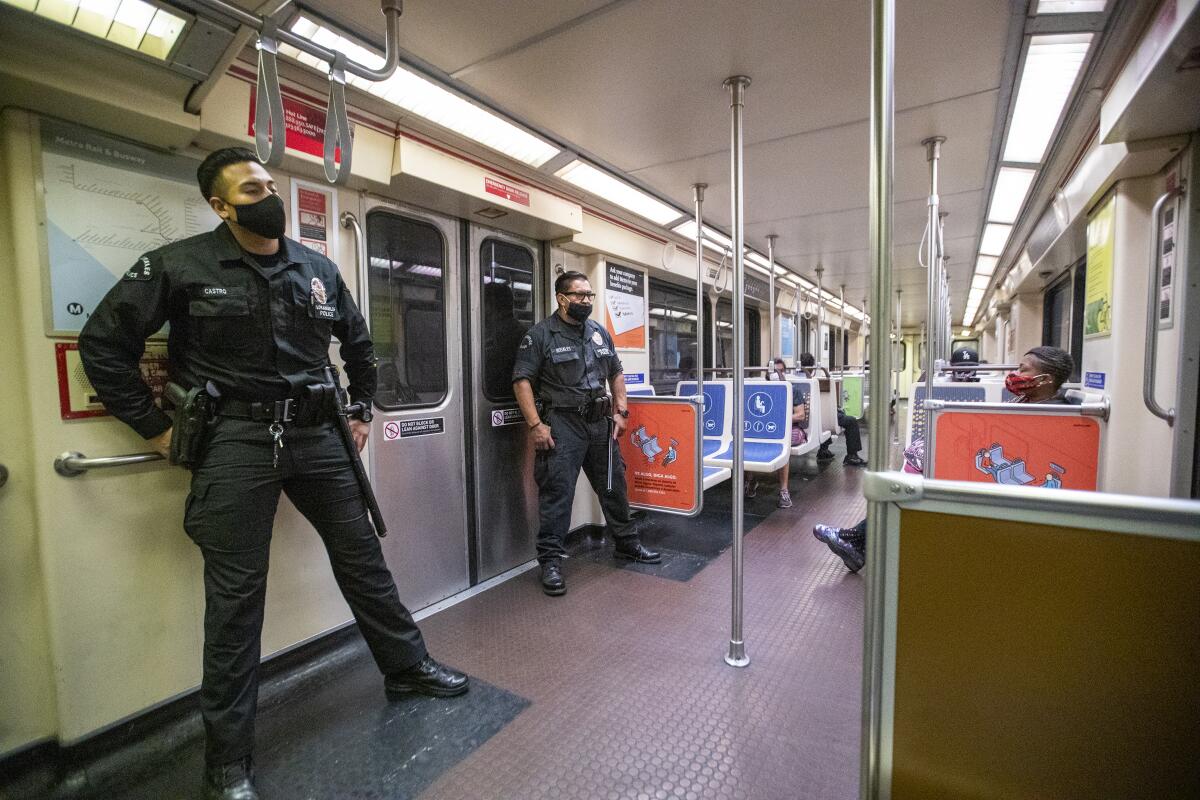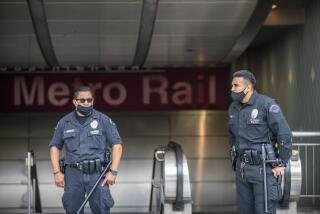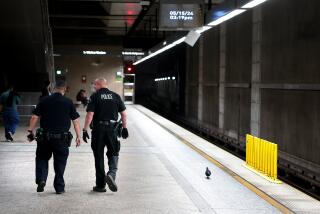L.A. Metro board pushes police reform, seeks to shift funds to homeless outreach

- Share via
Transportation officials on Thursday pushed Los Angeles County’s transit system to start a reform of policing on buses and trains, including no longer sending armed officers to respond to nonviolent crimes.
The Metropolitan Transportation Authority’s directors voted 9 to 2 to approve a package of reforms, including hiring unarmed ambassadors to work at stations, expanding fare discounts, finding alternatives to armed law enforcement and shifting funds to homeless outreach.
Those initiatives could be paid for by cutting some funding to policing, the measure said.
“We have a very long history … of passengers complaining about racial profiling and racial bias,” said director and L.A. City Councilman Mike Bonin, who introduced the motion. Many riders of color feel threatened by police on the system, he said, “but have no choice but to continue using it.”
Directors heard 129 public comments from riders and advocates, 105 of which supported the reform motion, Metro’s board secretary said. The majority urged Metro to remove armed police from buses, trains and stations.
“Why would an armed officer that routinely harms people that look like me ever make me feel safe?” said Los Angeles resident Brittani Nichols, an actor and writer, in a written comment. “Weaving them into every aspect of public life is an attack on Black lives that needs to end.”
“I have never felt comfortable with the rise of police on Metro,” said Gemma Jimenez, a student and transit rider who lives in North Hollywood. “I have witnessed the police harass, bully and use excessive force on transit riders.... The police did not, and will never, help us feel safe.”
After years of declining ridership, and rising assaults and violent crime, Metro nearly doubled the number of uniformed police on the transit system in 2017. Contracts with the Los Angeles Police Department, Los Angeles County Sheriff’s Department and Long Beach Police Department expire in 2022.
Spokesman Dave Sotero said in an email that the policing plans “directly benefit county transit riders” and reduced reported violent crime 23% from 2015 to 2019.
“Our police contract contains essential community relations, homeless outreach, ambassador and non-law enforcement causes that can form the basis of a future re-imagining of these services,” Sotero said.
Director John Fasana, a councilman from Duarte, said Metro should reexamine the customer code of conduct, which lays out penalties for riding without a fare, playing loud music, eating, littering and other banned behaviors.
During a crackdown on such violations in 2018, an LAPD officer dragged a young woman off a subway train because she refused to take her foot off a seat.
The shift comes as other U.S. transit agencies consider similar policies. Officials in Portland, Ore., trimmed the policing budget by $1.8 million. Boston’s transit police department banned the use of chokeholds. And in Washington, D.C., officials created a transit review board to address complaints of systemic racism.
Los Angeles County Supervisor Kathryn Barger, who voted against the community policing motion, said she wanted to see more homeless outreach services, but “not at the expense of law enforcement — I will not change my mind on that.”
“Sworn officers are essential for us,” Barger said. “Because of the acts of bad cops, we’re vilifying the entire industry. I think that’s wrong.”
In a study conducted by Metro last year, two-thirds of female riders said there were not enough police officers on the transit system. Current riders’ most common recommendation to improve safety was hiring more police.
That suggests Metro should try to fix the policing culture and perception of safety on the system, rather than remove police entirely, said director and Inglewood Mayor James T. Butts Jr.
“It will be far less expensive to change the culture of policing than to do some of the things I’ve heard put forward over the last few weeks,” Butts said.
One Pasadena resident wrote that reducing the number of police officers would “drastically reduce the strides made in the last year” to improve crime and cleanliness issues at the Fillmore light rail station.
“We need more law enforcement presence, not less,” said Michael Bailey, an Anaheim resident who takes Metro to downtown and to Long Beach. “Their presence deters crime. Their presence is important to all of our safety.”
The LAPD also came under fire Thursday after officers called in absent for nearly 700 transit shifts, all of which are eligible for overtime pay. The wave of absences followed Chief Michel Moore’s decision to temporarily freeze overtime.
Officials say offering premium pay for transit shifts makes them easier to fill, and is still cheaper for Metro than paying the cost of salaries and benefits for full-time transit officers.
The department “pushed and pushed” to shift some of the policing authority away from the Sheriff’s Department and to its own officers, said Metro director and county Supervisor Sheila Kuehl. The same week that LAPD called in absent en masse, she said, the absence rate among deputies was less than 1%.
“That is a problem,” Kuehl said. “I’d really like to understand how we can have confidence in LAPD when that was the case.”
More to Read
Sign up for Essential California
The most important California stories and recommendations in your inbox every morning.
You may occasionally receive promotional content from the Los Angeles Times.











